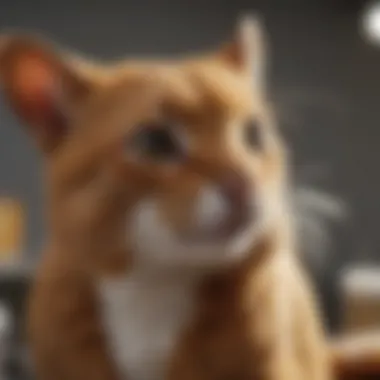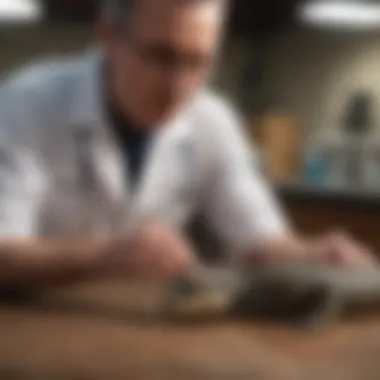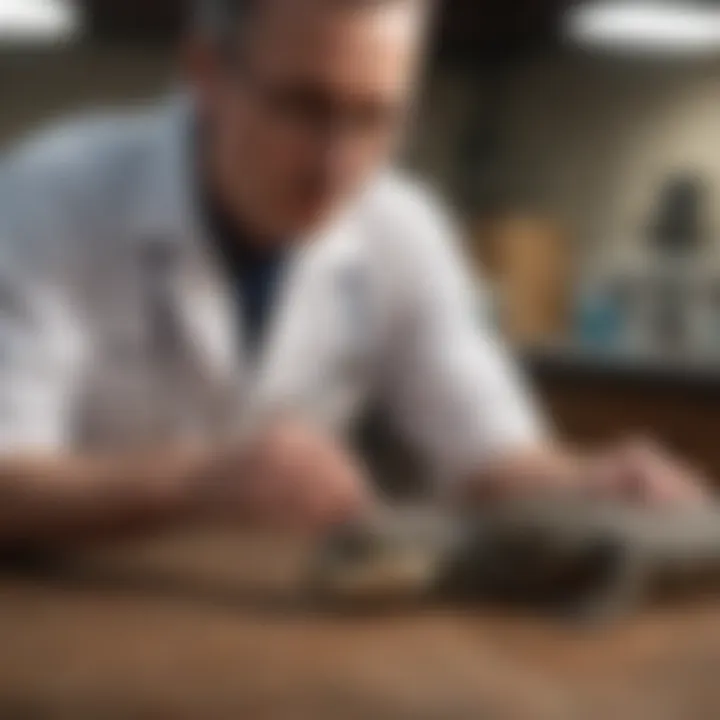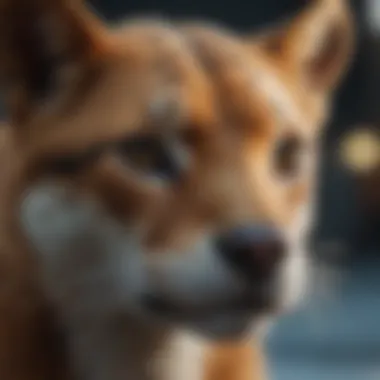Exotic Animal Veterinary Care in Raleigh, NC


Intro
In the vibrant community of Raleigh, North Carolina, there exists a unique branch of veterinary medicine that caters to an eclectic mix of pets—exotic animals. Unlike traditional pets like cats and dogs, exotic pets encompass everything from colorful birds and curious reptiles to fluffy rabbits and even ferrets. This diversity brings about a plethora of special considerations for both veterinarians and pet owners alike. Understanding the importance of these specialized vet services is critical, not just for the health of these fascinating creatures, but also for the peace of mind of their owners.
Veterinarians focused on exotic animals in Raleigh face distinctive challenges. They deal with species-specific needs that require specialized training and knowledge. In this article, we aim to unpack what it means to be an exotic animal vet in this region, delving into their qualifications, the variety of exotic pets needing care, and current trends in exotic pet ownership.
By exploring these topics, we hope to furnish current and prospective pet owners with insights and knowledge necessary to navigate the world of exotic pet care. The environment here is supportive and welcoming, fostering a deep bond between veterinarians and pet enthusiasts. Together, let's dive into the complex and enriching world of Raleigh's exotic animal vets.
Overview of Exotic Animal Veterinary Medicine
Exotic animal veterinary medicine occupies a unique niche within the broader field of veterinary science. The growing fascination with non-traditional pets calls for dedicated professionals who possess an understanding of the special needs of these animals, ranging from reptiles to birds and small mammals. This part of the article emphasizes the multiplier effects of both increased exotic pet ownership and the specific care required, drawing attention to the importance of these specialized veterinary services.
Definition of Exotic Pets
Exotic pets, as the term suggests, refer to animals that are not typically classified as dogs or cats. They share some characteristics that distinguish them from common household pets. The common thread among these creatures is their need for tailored care based on their inherent biology, behavior, and habitat needs. Examples include:
- Reptiles, like snakes and lizards, which require specific temperature and humidity levels.
- Birds, such as parrots, that need mental stimulation to avoid behavioral issues.
- Small mammals, like ferrets and hedgehogs, that often have distinct dietary requirements.
These pets often bring unique challenges due to their often intricate care demands. Pet owners should be aware that responsible ownership goes beyond mere companionship; it includes providing proper nutrition, environmental enrichment, and timely medical care.
The Growth of Exotic Pet Ownership
In recent years, the trend of owning exotic pets has seen a noticeable upsurge. A considerable number of families are diversifying their household companions, often seeking the novelty these creatures can provide. The reasons behind this boom are multifaceted:
- Increased Access: More pet stores, online retailers, and local breeders offer various exotic animals for sale.
- Urbanization: Many urban dwellers are drawn to smaller pets that do not require large living spaces, leading them to reptiles or small birds.
- Social Media Influence: Pictures and videos of exotic pets circulating on platforms like Facebook and Reddit spark interest and admiration, enticing new pet owners.
Overall, as more people embrace exotic pet ownership, the demand for knowledgeable exotic animal veterinarians will undoubtedly rise. This underscores the importance of specialized veterinary services, not only to ensure the health and well-being of these animals but also to educate pet owners about their responsibilities.
"When exotic pet ownership becomes popular, so does the need for veterinary professionals who truly understand the varied requirements of these unique animals."
This growing field calls for a comprehensive approach that meets both the physical and emotional needs of exotic pets, fostering a positive experience for owners and their cherished companions.
The Role of an Exotic Animal Vet
In a world where pets range from common furry companions to more exotic and varied species, the role of an exotic animal vet becomes increasingly important. These veterinarians aren't merely caregivers; they're specialists who navigate the complexities of treating creatures that can’t just communicate their ailments through typical means. Their expertise is essential not only for the well-being of these unique animals but also for the peace of mind of their owners.
Responsibilities and Services Provided
Exotic animal vets wear many hats. Their responsibilities extend beyond just diagnosing and treating illnesses. They offer a plethora of services tailored to the diverse needs of exotic pets, which include reptiles, birds, small mammals, and even exotic fish. Here’s a closer look at some of the key responsibilities:


- Preventative Care: Much like traditional pets, exotic animals benefit from routine wellness checks. These check-ups can catch many potential health issues before they become serious problems.
- Surgical Procedures: From spaying and neutering to more complex surgeries, exotic animal vets are trained to handle specific anatomical quirks of these creatures.
- Nutritional Advice: Many exotic pets have very specialized dietary needs. Vets provide guidance on proper feeding and nutrition to ensure that these animals thrive.
- Behavioral Counseling: Understanding the behavioral patterns of exotic animals is crucial. Vets help owners navigate any challenging behaviors that may arise.
With these responsibilities come challenges unique to exotic animal care. Many times, there is limited existing data on certain species, leading vets to rely on their own expertise and experience to make informed decisions. Moreover, some exotic pets can be more prone to specific health ailments which require tailored approaches to treatment.
Common Exotic Animal Species Treated
The variety of animals treated by exotic animal vets is as vast as the owners who keep them. Some of the common species include:
- Reptiles: Snakes, lizards, and tortoises often call for specialized handling, especially regarding their unique anatomy and environmental needs.
- Birds: Parrots, canaries, and geckos need unique care that includes monitoring their diet and habitat conditions.
- Small Mammals: Animals such as ferrets, rabbits, and guinea pigs are gaining popularity, but they come with their own set of health risks and commonly require vet visits.
- Aquatic Animals: Fish and other aquatic species also fall under the care of exotic animal vets, where water conditions and specific dietary plans are vital.
"A vet for exotic animals is like a translator who can communicate with creatures that speak through their body language, colors, and habits rather than words."
In summary, the role of an exotic animal vet is both rewarding and complex, addressing the challenges of treating a broad spectrum of unique pets while ensuring the highest level of care. As the landscape of pet ownership evolves, so too does the critical role of these veterinarians, providing not just medical attention but also educational resources and support for responsible pet ownership.
Educational Pathways and Certifications
The field of exotic animal veterinary medicine requires a unique blend of knowledge, skills, and experience. For anyone looking to make their mark in this specialized area, educational pathways and certifications serve as the foundation upon which a successful career is built. It’s not just about having a passion for animals; it’s about understanding the intricate details that come with caring for diverse species.
Necessary Academic Background
To embark on a journey toward becoming an exotic animal vet, one must first obtain foundational education in veterinary medicine. Prospective veterinarians typically need to earn a Doctor of Veterinary Medicine (DVM) degree from an accredited veterinary school. This entails rigorous coursework, hands-on practical training, and a deep dive into animal biology, anatomy, pharmacology, and more. It’s not just checking boxes; students must immerse themselves in understanding the differences between treating a cat and a parrot.
Notably, some universities offer tracks or concentrations focused specifically on exotic animal medicine. This leads to a more tailored experience, equipping students with essential knowledge about various non-traditional pets—from reptiles to birds and small mammals.
Specialized Training and Internships
Beyond academic training, aspiring exotic animal vets should pursue specialized training. Engaging in internships or externships at facilities that cater to exotic pets can offer invaluable experience. It’s through these hands-on opportunities that they truly grasp the nuances of care and treatment. The environment can vary significantly compared to traditional veterinary practice, so being adaptable is key.
Placing emphasis on learning directly from professionals in the field can significantly enhance their skill set. These rotations often expose interns to unique medical scenarios, fostering critical problem-solving abilities.
Certifications in Exotic Animal Medicine
While a DVM lays the groundwork, additional certifications can enhance a veterinarian's credibility and demonstrate their expertise. Organizations like the American Board of Veterinary Practitioners (ABVP) offer certification in exotic companion animals. This certification process involves rigorous examinations and showcases a veterinarian’s commitment to high standards of care specific to exotic species.
Obtaining such credentials can not only propel a career forward but also instill confidence among pet owners. A certified veterinarian is often seen as more knowledgeable and trustworthy, especially when it comes to treating complex or unusual health issues that exotic pets may face.
In summary, educational pathways and certifications are paramount for anyone venturing into the realm of exotic animals. They not only prepare individuals for the practical realities of the profession but equip them with the necessary tools to navigate challenges uniquely associated with exotic species. As the popularity of exotic pets continues to rise, the demand for qualified veterinarians remains critical, making this area of expertise more relevant than ever.
Challenges Faced by Exotic Animal Vets


The realm of exotic animal veterinary medicine is not a walk in the park; it can be as tricky as untangling a ball of yarn left alone by a curious kitten. Exotic animal vets encounter a unique set of challenges that reflect the complexities of caring for pets that are markedly different from the typical cat or dog. Acknowledging these challenges is essential for understanding the dedication required in this specialized field.
Health Risks and Diseases Common in Exotic Pets
Exotic pets, cherished by their owners for their uniqueness, often come with health peculiarities that can pose considerable challenges. For instance, reptiles are particularly prone to metabolic bone disease, a condition that arises from improper calcium and phosphorus balance. Meanwhile, birds may suffer from obesity-related issues, often due to an inadequate diet supplied by their owners.
- Common Health Problems:
Respiratory infections are frequent in birds, while skin disorders plague many species.
Parasites are also a significant concern, whether they originate from the pet or the environment.
Veterinarians must maintain a keen eye for these often subtle signs when treating these exotic animals, as symptoms can be easily overlooked. Being able to spot the differences between normal behaviors and those indicating distress is vital for timely intervention. For vets, each consultation becomes akin to solving a puzzle, piecing together clues that will lead to the right diagnosis and treatment plan.
"In exotic pet care, thoroughness is key. The health risks may be less obvious than with dogs and cats, making vigilance essential."
Legal and Ethical Considerations
Navigating the legal and ethical landscape of exotic animal care can feel like walking a tightrope. Exotic pets frequently fall under a web of regulations that differ by species and jurisdiction. In Raleigh, as in many places, certain animals may be illegal to own or have strict conditions that owners must meet. This adds a layer of complexity, as vets often need to stay informed about local laws governing exotic animal ownership.
- Regulations:
Endangered species laws can restrict the treatment options available for certain animals.
Permits may be required before ownership of particular species, and vets must ensure that their clients comply with these regulations.
Ethical considerations come into play as well. Vets must evaluate whether to recommend treatments that may not be in the best interest of the animal, especially when financial costs come into play. The pressure can weigh heavily on the practitioners, who must ensure they are acting within both legal and ethical boundaries. A constant balancing act ensues, where the priority is ultimately the welfare of the animal, despite the complexities involved.
Facilities and Resources Available in Raleigh, NC
When it comes to caring for exotic pets, the quality of facilities and resources available is crucial. Raleigh offers some specialized veterinary clinics and resources that cater specifically to the needs of these unique animals. This section delves into how these resources shape the environment for both exotic pets and their owners, and why they are of paramount importance in this specialized field.
Overview of Veterinary Clinics Specializing in Exotic Animals
In Raleigh, various veterinary clinics demonstrate a profound understanding of exotic animal medicine. Numerous facilities focus solely on exotic pets, which is a rarity among many veterinary practices. These clinics often have veterinarians with specialized training in exotic animal care, providing services for pets ranging from reptiles to birds and small mammals. Some notable examples include
- Pawsitively Exotic Vet Clinic: Known for its focus on reptiles and amphibians, offers consultations tailored to the specific needs of each species.
- Exotic Animal Care Center: This facility has a team of veterinarians experienced in treating birds and exotic mammals, ensuring they recognize the unique health considerations each species presents.
Such clinics are not just limited to offering medical services. Many provide educational resources and community outreach, helping pet owners understand better how to care for their exotic companions. This creates a comprehensive support system that fosters the well-being of animals and nurtures a community of informed pet owners.
Importance of Advanced Medical Equipment
Investments in advanced medical equipment cannot be overstated, as they significantly enhance the level of care available for exotic pets. Just like any specialized field, having the right tools makes all the difference. Many veterinary clinics in Raleigh prioritize acquiring state-of-the-art technology to ensure accurate diagnostics and effective treatments. Some essential equipment often found in these facilities includes:
- Digital Radiography: This allows for quick and precise imaging of bones and internal organs, enabling vets to diagnose conditions that may not be readily apparent.
- Endoscopes: Used for non-invasive procedures, these tools give vets the ability to examine the respiratory or gastrointestinal tract without major surgeries.
- Ultrasounds: Helpful in assessing soft tissue conditions, providing insights into various health issues affecting exotic animals.
By employing advanced technology, clinics can offer more accurate diagnoses and tailor their treatments to suit the intricate needs of different species. As a result, the prognosis for many exotic pets increases.


"Having access to modern medical equipment is a game changer. It lets us dive deep into diagnostics. The more we discover, the better we can treat our patients." - Lead Veterinarian at Exotic Animal Care Center.
Client Education and Exotic Pet Care
In the realm of exotic animal veterinary medicine, client education plays an indispensable role. It's not simply about treating pets when they’re sick; it involves empowering pet owners with knowledge that fosters healthier lives for their unique companions. Exotic pets come with their own set of needs, and understanding these nuances can make all the difference in their well-being.
Veterinarians serve a dual purpose: they are the caretakers of these animals but also the educators of their human counterparts. Owners can certainly benefit from knowing about their specific pet's requirements—be it dietary preferences, habitat setups, or even social behaviors. An informed owner is more likely to notice subtleties in their pets' habits, which could signal potential health issues before they turn into major problems.
Best Practices for Exotic Pet Owners
To ensure that exotic pets thrive, below are some best practices for pet owners to adopt:
- Research Before Acquisition: Understanding the species is crucial. Different animals have vastly different needs, and what works for one may not at all suit another. For example, having a parakeet differs vastly from caring for a ball python.
- Regular Check-ups: Just as you would with a dog or cat, make routine vet visits a priority for exotic pets. They often hide ailments, and regular check-ups can help detect issues early.
- Diet and Nutrition: Know your pet's dietary needs. Many exotic animals need specialized diets that cater to their native habitats. A vet can help guide owners on what to feed them.
- Environment Setup: Create an environment that mirrors their natural habitat. This not only provides comfort but also encourages natural behaviors. Assess heating, humidity, and available space.
- Social Interaction and enrichment: Some exotic pets require social interaction while others thrive in solitude. Interactive toys can also provide mental stimulation.
"An educated pet owner is the best medicine for a healthy pet."
Common Misconceptions about Exotic Pets
It's easy for myths to circulate regarding exotic animals, and these misconceptions can often lead to poor care practices. Addressing these misunderstandings is vital for promoting responsible ownership, so here are a few common misconceptions:
- All Exotic Pets Are Low Maintenance
Contrary to popular belief, exotic pets often require just as much—or more—attention compared to traditional pets. Their care can be quite involved, depending on the species. - Exotic Animals Don’t Need Vet Care
Many owners might think that if a pet appears healthy, they do not require veterinary care. This could not be more wrong. Regular check-ups are essential as many issues aren’t visibly apparent. - Diet Doesn't Matter As Long As They Eat
It's a mistake to think that just any food will do. Each species has specific dietary requirements, and improper nutrition can lead to severe health problems. - All Exotic Pets Are Friendly
Just like more common pets, exotic animals also have personalities. Understanding each species' temperament is necessary before bringing one into your home.
A solid foundation of knowledge helps ensure that these pets not only survive but thrive in their human environments. Understanding the realities of exotic animal care leads to better practices, ultimately benefiting both the pet and the owner.
The Future of Exotic Animal Veterinary Medicine
The field of exotic animal veterinary medicine is not just an afterthought; it's evolving to meet the changing needs of both pets and their owners. As pet ownership trends shift to include a more diverse range of animals, the role of these specialists becomes increasingly important. This section delves into the forward-looking aspects of exotic animal care, pinpointing what lies ahead.
Emerging Trends in Exotic Pet Ownership
The landscape of pet ownership is undergoing a notable transformation. Historically, most households tended to gravitate towards traditional pets like dogs and cats. However, we've seen a marked shift toward exotic animals, including reptiles, birds, and small mammals. This change is driven by a myriad of factors:
- Increased exposure to exotic pets: The advent of social media platforms where unique pets are showcased has made previously obscure species more accessible and appealing. Pet owners now admire animals that were once considered unconventional.
- Educational resources: More reliable information about the care and maintenance of exotic pets is becoming readily available online, aiding potential owners in making educated decisions. This information influx has also upped the ante in proper care practices.
- Focus on sustainability: An increasing number of individuals are seeking pets that have a lower environmental impact. Choosing exotic animals can sometimes align with these values, particularly with species that are bred in captivity and not taken from the wild.
These trends usher in new challenges and responsibilities for exotic vets, who must stay abreast of the specific needs of these species and their owners.
Advancements in Veterinary Medicine Technology
The future isn't just about the pets themselves; it's also about the incredible technological strides being made in veterinary medicine that specifically benefit exotic animals. The onus is on vets to harness these innovations to provide better care:
- Telemedicine: Much like in human healthcare, the rise of telemedicine enables vets to consult owners remotely. This can be especially useful for exotic pet owners in Raleigh who may not have immediate access to specialized care. Whether it’s for routine follow-ups or minor assessments, it opens up a new avenue for pet care.
- Advanced diagnostics: Techniques like ultrasound, MRI, and CT scans are sprouting across veterinary facilities, allowing for more thorough examinations of exotic species. These technologies can help identify issues that are not apparent through traditional methods.
- Specialized equipment: The creation of bespoke tools suited to the anatomical and physiological requirements of exotic animals also marks a significant leap. From tailor-made surgical instruments to dedicated enclosures for recovery, each innovation aims to minimize stress for the animal while enhancing the success of procedures.
- Research and development: The ongoing exploration of exotic pet health issues, like specific diseases and their treatments, promises to yield better outcomes in the coming years. Understanding the diseases affecting exotic species leads to more targeted therapies and intervention strategies.
“As the field progresses, the collaboration among veterinarians, researchers, and pet owners is vital to promote enhanced health outcomes for exotic animals.”
The future of exotic animal veterinary medicine in Raleigh, NC, is indeed filled with potential. By keeping an eye on both ownership trends and advancements in technology, veterinary professionals can better serve the needs of their unique patients. A symbiosis of knowledge and innovation is essential for continued success in this specialized area of practice.







